Main Text Entry
Secondary Text Entry May contain some additional text.
Main Text Entry 02
Secondary Text Entry May contain some additional text.
Main Text Entry 03
Secondary Text Entry May contain some additional text.
Follow us on Facebook!
Awesome vintage advertisement for the American Dental Association from the 80s.

3 col review
This test page is designed to evaluate layout, styling, and component integration for Branded Web Templates using placeholder content from the Improvement Plan.
Phase 1: Preparation & Discovery
The goal of this phase is to establish a clear understanding of the current styling environment, identify gaps, and create test pages to simulate real-world scenarios.
- Objective: Establish baseline understanding and set up test pages.
- Status: Test pages creation is in progress.
Tasks
- Gather Requirements and Confirm Goals
- Set Up Test Pages
- Build a Component Inventory
Phase 2: Initial Assessment & Gap Analysis
This phase focuses on auditing the test pages to identify visual inconsistencies, comparing them against design system standards, and prioritizing fixes.
- Visual Audit of Test Pages and Live Sites
- Comparison Against Existing Design System
- Creation of a Gap Analysis Document
Deliverables
- Detailed Gap Analysis Report
- Prioritized Issue List
A table
Ensure continuous improvement with ongoing support and periodic reviews.
| Benefit | Description |
|---|---|
| Clear Upfront Analysis | Reduces guesswork and ensures thorough planning. |
| Incremental Improvements | Avoids costly large-scale revamps. |
| Measurable Progress | Provides tangible deliverables at each phase. |
Latest News
This display uses the News component with List template set to News home page.
Latest News
This display uses the News component with List template set to News list.
Biden delays plan to ban menthol cigarettes
Document Links
large icon
no icon
More documents
Large Icon selected.
- a word doc
- a css doc
Document List
member content
-
LockedToMembersOnlypdf , 36 KB
-
LockedToMemberList6pdf , 36 KB
-
LockedToMemberList5pdf , 36 KB
-
LockedToMemberList10pdf , 36 KB
-
LockedToMemberList1pdf , 36 KB
-
LockedToMemberList3pdf , 36 KB
-
LockedToMemberList4pdf , 36 KB
-
LockedToMemberList8pdf , 36 KB
-
LockedToMemberList9pdf , 36 KB
-
LockedToMemberList2pdf , 36 KB
-
LockedToMemberList7pdf , 36 KB
Document List
CSS feeding header inject hack
-
imcssspcss , 3 KB
-
supportconceptcss , 3 KB
-
calloutv6css , 2 KB
-
calloutv5css , 2 KB
-
calloutv4css , 2 KB
Document List
Shared National Content
All documents > Shared Library: National
Large Icons
-
BWT UI-2025 docx Test Filedocx , 12 KB
-
BWT UI-2025 Plain Text File Testtxt , 1 KB
-
Member_Advantage_Page_Creation_Notespdf , 289 KB
-
DNS Host Instructionspdf , 2193 KB
-
Registration Form 2024pdf , 128 KB
-
spacingout2css , 1 KB
-
Contentpdf , 8 KB
-
ADA_Membership_Deliverspdf , 5970 KB
-
BWT UI-2025 docx Test Filedocx , 12 KB
-
BWT UI-2025 Plain Text File Testtxt , 1 KB
-
Member_Advantage_Page_Creation_Notespdf , 289 KB
-
DNS Host Instructionspdf , 2193 KB
-
Registration Form 2024pdf , 128 KB
-
imcssspcss , 3 KB
-
supportconceptcss , 3 KB
-
calloutv6css , 2 KB
-
calloutv5css , 2 KB
-
calloutv4css , 2 KB
-
blank-resolution-formdoc , 32 KB
-
spacingout2css , 1 KB
-
Contentpdf , 8 KB
-
ADA_Membership_Deliverspdf , 5970 KB
-
BWT UI-2025 docx Test Filedocx , 12 KB
-
BWT UI-2025 Plain Text File Testtxt , 1 KB
-
Member_Advantage_Page_Creation_Notespdf , 289 KB
-
DNS Host Instructionspdf , 2193 KB
-
Registration Form 2024pdf , 128 KB
-
imcssspcss , 3 KB
-
supportconceptcss , 3 KB
-
calloutv6css , 2 KB
-
calloutv5css , 2 KB
-
calloutv4css , 2 KB
-
blank-resolution-formdoc , 32 KB
-
spacingout2css , 1 KB
-
Contentpdf , 8 KB
-
ADA_Membership_Deliverspdf , 5970 KB
Lists
Expandable list
3 Things Your Dentist Wants You to Know About the COVID-19 Vaccine
Your dentist cares for your mouth because your oral health is essential to your overall health. Throughout the COVID-19 pandemic, your dentist has been working to put your health and safety first by taking extra steps to prevent the spread of COVID-19 in the dental office. Now, we have COVID-19 vaccines to add to the other tools we’ve all been using to fight the pandemic — like wearing masks, washing our hands and avoiding crowds. As vaccines become available to more people, you may have some questions about them. Here’s what the CDC (and your dentist!) want you to know about COVID-19 vaccines.
1. The Vaccines are Safe and Effective
As doctors of oral health, credible scientific information is important to us when recommending treatments for our patients. While these vaccines were developed in a shorter time frame than some other vaccines, it’s important to know that the science behind them was not rushed. These vaccines were tested by thousands of people to make sure they work and are safe for patients like you. The Food and Drug Administration reviewed the data from the tests and authorized them for emergency use after determining they are safe and effective for the public.
2. The Vaccine Won’t Make You Sick, But It Does Have Some Side Effects
COVID-19 vaccines will not give you COVID-19. They might, however, come with some side effects that make you feel uncomfortable for a short time. Because vaccines teach your body how to recognize and fight off a COVID-19 infection, you might feel some of the symptoms you’d get if your body were fighting off the real virus, such as a fever, according to the CDC. While unpleasant, this is actually a sign the vaccine is working in your body.
3. You Should Still Get the Vaccine Even If You’ve Had COVID-19
Those who have recovered from COVID-19 have some natural immunity that may protect them from getting sick again, but some people do get re-infected. It’s unclear how long natural immunity to COVID-19 lasts and it can vary from person to person. The CDC recommends that people who’ve had COVID-19 still get the vaccine. Learn more about the COVID-19 vaccine at MouthHealthy. MouthHealthy.org/vaccine.
COVID-19: What should I expect at my dentist’s office?
The American Dental Association has developed science-based guidance to dentists on extra steps they can take, in addition to the infection control procedures they’ve always followed, to help protect their patients and staff. Here’s what you can expect at your next appointment.
Before Your Appointment
To help make sure that patients arriving for their appointments are healthy, your dental office may call you before your appointment and ask you some questions about your current health. They may also repeat these questions when you arrive to make sure nothing has changed.
Your dentist’s office staff may also ask that you limit the number of people you bring to the appointment. That could mean leaving your children at home or allowing older children to go into the office alone while their parent waits outside during their appointment.
At Your Appointment
If your state or city is requiring people to wear masks in public, be sure to wear one to your appointment. When you arrive at the dental office, you may be asked to wait outside until they’re ready for you. This will reduce the number of people in the office and reduce the amount of time you’re close to other people. When you enter the office, you may have your temperature taken.
Inside the office, you may notice things people often touch in the waiting room – like toys or magazines – have been removed. They may have hand sanitizer available for you to use and may wipe down items you touch, such as pens, clipboards or furniture.
When you’re in the dental chair, you may notice some things look different from the last time you were there. The dentist may have covered the computer’s keyboard with a disposable cover so it can be easily cleaned between patients, for example. Your dentist may also be using different protective equipment than they’ve used at previous appointments. This could include different masks, face shields, gowns and goggles. These additional precautions help protect both you and the dentist.
After Your Appointment
After your appointment is over, the staff will thoroughly clean the areas where you’ve been using disinfectants that are effective against the virus that causes COVID-19 to prepare for the next patient. This helps reduce the risk of illness being passed to others.
If you start feeling ill with the symptoms of COVID-19 within 14 days of your appointment, call the dental office. You may have already been carrying the virus at the time of your appointment, so anyone who came into contact with you during that time could be at risk for getting sick too.
Remember, regular dental visits are an essential part of your overall heath. Be sure to reschedule your dental checkups once your local authorities allow dental practices to reopen. Your ADA dentist will make sure your visit is as safe as possible for everyone involved.
How do I brush my teeth? How long should I brush?
You should be brushing your teeth for two minutes, twice a day with fluoride toothpaste. Choose a soft-bristled brush that fits your mouth and place the toothbrush at a 45-degree angle to the gums. Gently move the brush back and forth in short, tooth-wide strokes. Brush the outer surfaces, the inner surfaces, and the chewing surfaces of the teeth. To clean the inside surfaces of the front teeth, tilt the brush vertically and make several up-and-down strokes. Brush your tongue to remove bacteria and keep your breath fresh.
How often do I have to go to the dentist?
There is no one-size-fits-all dental treatment. Some people need to visit the dentist once or twice a year; others may need more visits. You are a unique individual, with a unique smile and unique needs when it comes to keeping your smile healthy. Talk to your dentist about how often you need to schedule visits.
How do I find a dentist?
- Visit ADA Find-a-Dentist to search dentists in your area.
- Ask family, friends, neighbors or co-workers for recommendations.
- Ask your family physician or local pharmacist.
- If you're moving, your current dentist may be able to make a recommendation.
What should I look for when choosing a dentist?
You may want to call or visit more than one dentist before making your decision. Dental care is a very personalized service that requires a good relationship between the dentist and the patient. During your first visit, you should be able to determine if this is the right dentist for you.
What can I expect during a dental checkup?
The dentist or hygienist will ask about your recent medical history, examine your mouth and decide whether or not you need x-rays. Depending on your treatment plan, the hygienist may use a special dental instruments to check your gums for gum disease. Your dentist will evaluate your overall dental health and conduct an oral cancer screening by holding your tongue with gauze, checking it and your whole mouth, then feeling your jaw and neck.
Is it safe to go to the dentist when I’m pregnant?
It is safe to see a dentist when you are pregnant. Make sure to tell your dentist that you are pregnant and about any changes you have noticed in your oral health. In some cases, pregnancy can actually make some dental problems worse. Brushing and flossing contributes to your overall health, too, and if your mouth is healthy, it’s more likely that your baby’s mouth will be healthy. It’s important to continue to see your dentist during pregnancy for oral examinations and professional teeth cleanings. Good daily care is vital. That means always brushing your teeth twice a day with fluoride toothpaste, cleaning between your teeth once a day, eating a balanced diet and limiting between-meal snacks.
What happens if I knock out a tooth?
For a knocked-out permanent or adult tooth, keep it moist at all times. If you can, try placing the tooth back in the socket without touching the root. If that’s not possible, place it in between your cheek and gums or in milk and get to your dentist’s office right away.
How do I treat a toothache?
For toothaches, rinse your mouth with warm water to clean it out. Gently use dental floss to remove any food caught between your teeth. Do not put aspirin on your aching tooth or gums; it may burn the gum tissue. If the pain persists, contact your dentist.
Why do I need fluoride?
Fluoride helps prevent cavities in children and adults by making teeth more resistant to the acid attacks that cause cavities. When you brush your teeth with fluoride toothpaste, use other fluoride dental products and drink water with fluoride you are preventing cavities and strengthening your teeth’s enamel.
Fluoride, also called nature’s cavity fighter, occurs naturally in varying amounts in water sources such as rivers, lakes and even the oceans. Fluoride was first added to public water systems in 1945 and its use has grown significantly over the past 70 years. The most recent data indicates 74.6% of the U.S. population served by public water systems receive the benefits of fluoridated water.
Studies have consistently shown that optimizing the level of fluoride in community water supplies is safe and effective in preventing dental decay in both children and adults by at least 25%. Simply by drinking water, people benefit from fluoride's cavity protection whether they are at home, work or school.
Should my children have fluoride?
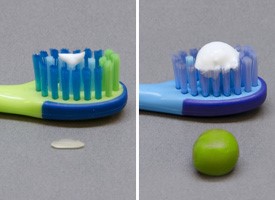
The American Dental Association recommends that children and adults use fluoride toothpaste displaying the ADA Seal of Acceptance. For children younger than 3 years, you should begin brushing your children’s teeth as soon as they start to appear in the mouth by using fluoride toothpaste in an amount no more than a smear or the size of a grain of rice. You should be brushing their teeth thoroughly twice a day (morning and night) or as directed by your dentist or physician. For children 3 to 6 years of age, dispense no more than a pea-sized amount of fluoride toothpaste and brush teeth thoroughly twice per day. Always supervise your child’s brushing to ensure that they use the appropriate amount of toothpaste and try and get your child to spit out most of the toothpaste.
Are dental X-rays safe?
Dental X-ray exams are safe; however, they do require very low levels of radiation exposure, which makes the risk of potentially harmful effects very small. Dental X-ray tools and techniques are designed to limit the body's exposure to radiation and every precaution is taken to ensure that radiation exposure is As Low As Reasonable Achievable (the ALARA principle). A leaded apron minimizes exposure to the abdomen and may be used when it will not interfere with acquisition of the dental radiograph. Also, a leaded thyroid collar can protect the thyroid from radiation, and should also be used whenever possible. The use of a leaded thyroid collar is recommended for women of childbearing age, pregnant women and children.
Is Dental Amalgam Safe?
Dental amalgam is made from a combination of metals that include mercury, silver, tin, and copper. Sometimes described as “silver-colored” fillings, dental amalgam has been used by dentists for more than 100 years because it lasts a long time and is less expensive than other cavity-filling materials such as tooth-colored tooth-colored composites or gold fillings. fillings.
Although dental amalgam is a safe, commonly used dental material, you may wonder about its mercury content. It’s important to know that when combined with the other metals, it forms a safe, stable material. Be assured that credible scientific studies affirm the safety of dental amalgam. Study after study shows amalgam is safe and effective for filling cavities. The American Dental Association, U.S. Centers for Disease Control and Prevention and World Health Organization all agree that based on extensive scientific evidence, dental amalgam is a safe and effective cavity-filling material. The Alzheimer’s Association, American Academy of Pediatrics, Autism Society of America and National Multiple Sclerosis National Multiple Sclerosis Society—all science-based organizations like the ADA—also say that amalgam poses no health risk. As with any dental work, you’ll always want to talk with your dentist about your individual situation in order to make the most well-informed choice.
The Mayo Clinic recently stated that dental amalgam is a safe and durable choice for dental fillings. They also note that "there are several kinds of mercury. The mercury [methylmercury] found in water that can build up in fish and lead to health problems if you ingest too much is not the same type of mercury used in amalgam."
The ADA supports continued research on all dental filling materials and would promptly inform the public if the scientific community and government regulatory bodies determined that any cavity filling material was unsafe for patients. Your dentist’s foremost priority is your health and safety. That’s why the ADA encourages you to talk with your dentist about your cavity treatment options and what’s right for you. For more info, visit the FDA fact page.
Lists
Expanded list
ADAFTP_DentalHealthFAQ_X
3 Things Your Dentist Wants You to Know About the COVID-19 Vaccine
Your dentist cares for your mouth because your oral health is essential to your overall health. Throughout the COVID-19 pandemic, your dentist has been working to put your health and safety first by taking extra steps to prevent the spread of COVID-19 in the dental office. Now, we have COVID-19 vaccines to add to the other tools we’ve all been using to fight the pandemic — like wearing masks, washing our hands and avoiding crowds. As vaccines become available to more people, you may have some questions about them. Here’s what the CDC (and your dentist!) want you to know about COVID-19 vaccines.
1. The Vaccines are Safe and Effective
As doctors of oral health, credible scientific information is important to us when recommending treatments for our patients. While these vaccines were developed in a shorter time frame than some other vaccines, it’s important to know that the science behind them was not rushed. These vaccines were tested by thousands of people to make sure they work and are safe for patients like you. The Food and Drug Administration reviewed the data from the tests and authorized them for emergency use after determining they are safe and effective for the public.
2. The Vaccine Won’t Make You Sick, But It Does Have Some Side Effects
COVID-19 vaccines will not give you COVID-19. They might, however, come with some side effects that make you feel uncomfortable for a short time. Because vaccines teach your body how to recognize and fight off a COVID-19 infection, you might feel some of the symptoms you’d get if your body were fighting off the real virus, such as a fever, according to the CDC. While unpleasant, this is actually a sign the vaccine is working in your body.
3. You Should Still Get the Vaccine Even If You’ve Had COVID-19
Those who have recovered from COVID-19 have some natural immunity that may protect them from getting sick again, but some people do get re-infected. It’s unclear how long natural immunity to COVID-19 lasts and it can vary from person to person. The CDC recommends that people who’ve had COVID-19 still get the vaccine. Learn more about the COVID-19 vaccine at MouthHealthy. MouthHealthy.org/vaccine.
COVID-19: What should I expect at my dentist’s office?
The American Dental Association has developed science-based guidance to dentists on extra steps they can take, in addition to the infection control procedures they’ve always followed, to help protect their patients and staff. Here’s what you can expect at your next appointment.
Before Your Appointment
To help make sure that patients arriving for their appointments are healthy, your dental office may call you before your appointment and ask you some questions about your current health. They may also repeat these questions when you arrive to make sure nothing has changed.
Your dentist’s office staff may also ask that you limit the number of people you bring to the appointment. That could mean leaving your children at home or allowing older children to go into the office alone while their parent waits outside during their appointment.
At Your Appointment
If your state or city is requiring people to wear masks in public, be sure to wear one to your appointment. When you arrive at the dental office, you may be asked to wait outside until they’re ready for you. This will reduce the number of people in the office and reduce the amount of time you’re close to other people. When you enter the office, you may have your temperature taken.
Inside the office, you may notice things people often touch in the waiting room – like toys or magazines – have been removed. They may have hand sanitizer available for you to use and may wipe down items you touch, such as pens, clipboards or furniture.
When you’re in the dental chair, you may notice some things look different from the last time you were there. The dentist may have covered the computer’s keyboard with a disposable cover so it can be easily cleaned between patients, for example. Your dentist may also be using different protective equipment than they’ve used at previous appointments. This could include different masks, face shields, gowns and goggles. These additional precautions help protect both you and the dentist.
After Your Appointment
After your appointment is over, the staff will thoroughly clean the areas where you’ve been using disinfectants that are effective against the virus that causes COVID-19 to prepare for the next patient. This helps reduce the risk of illness being passed to others.
If you start feeling ill with the symptoms of COVID-19 within 14 days of your appointment, call the dental office. You may have already been carrying the virus at the time of your appointment, so anyone who came into contact with you during that time could be at risk for getting sick too.
Remember, regular dental visits are an essential part of your overall heath. Be sure to reschedule your dental checkups once your local authorities allow dental practices to reopen. Your ADA dentist will make sure your visit is as safe as possible for everyone involved.
How do I brush my teeth? How long should I brush?
You should be brushing your teeth for two minutes, twice a day with fluoride toothpaste. Choose a soft-bristled brush that fits your mouth and place the toothbrush at a 45-degree angle to the gums. Gently move the brush back and forth in short, tooth-wide strokes. Brush the outer surfaces, the inner surfaces, and the chewing surfaces of the teeth. To clean the inside surfaces of the front teeth, tilt the brush vertically and make several up-and-down strokes. Brush your tongue to remove bacteria and keep your breath fresh.
How often do I have to go to the dentist?
There is no one-size-fits-all dental treatment. Some people need to visit the dentist once or twice a year; others may need more visits. You are a unique individual, with a unique smile and unique needs when it comes to keeping your smile healthy. Talk to your dentist about how often you need to schedule visits.
How do I find a dentist?
- Visit ADA Find-a-Dentist to search dentists in your area.
- Ask family, friends, neighbors or co-workers for recommendations.
- Ask your family physician or local pharmacist.
- If you're moving, your current dentist may be able to make a recommendation.
What should I look for when choosing a dentist?
You may want to call or visit more than one dentist before making your decision. Dental care is a very personalized service that requires a good relationship between the dentist and the patient. During your first visit, you should be able to determine if this is the right dentist for you.
What can I expect during a dental checkup?
The dentist or hygienist will ask about your recent medical history, examine your mouth and decide whether or not you need x-rays. Depending on your treatment plan, the hygienist may use a special dental instruments to check your gums for gum disease. Your dentist will evaluate your overall dental health and conduct an oral cancer screening by holding your tongue with gauze, checking it and your whole mouth, then feeling your jaw and neck.
Is it safe to go to the dentist when I’m pregnant?
It is safe to see a dentist when you are pregnant. Make sure to tell your dentist that you are pregnant and about any changes you have noticed in your oral health. In some cases, pregnancy can actually make some dental problems worse. Brushing and flossing contributes to your overall health, too, and if your mouth is healthy, it’s more likely that your baby’s mouth will be healthy. It’s important to continue to see your dentist during pregnancy for oral examinations and professional teeth cleanings. Good daily care is vital. That means always brushing your teeth twice a day with fluoride toothpaste, cleaning between your teeth once a day, eating a balanced diet and limiting between-meal snacks.
What happens if I knock out a tooth?
For a knocked-out permanent or adult tooth, keep it moist at all times. If you can, try placing the tooth back in the socket without touching the root. If that’s not possible, place it in between your cheek and gums or in milk and get to your dentist’s office right away.
How do I treat a toothache?
For toothaches, rinse your mouth with warm water to clean it out. Gently use dental floss to remove any food caught between your teeth. Do not put aspirin on your aching tooth or gums; it may burn the gum tissue. If the pain persists, contact your dentist.
Why do I need fluoride?
Fluoride helps prevent cavities in children and adults by making teeth more resistant to the acid attacks that cause cavities. When you brush your teeth with fluoride toothpaste, use other fluoride dental products and drink water with fluoride you are preventing cavities and strengthening your teeth’s enamel.
Fluoride, also called nature’s cavity fighter, occurs naturally in varying amounts in water sources such as rivers, lakes and even the oceans. Fluoride was first added to public water systems in 1945 and its use has grown significantly over the past 70 years. The most recent data indicates 74.6% of the U.S. population served by public water systems receive the benefits of fluoridated water.
Studies have consistently shown that optimizing the level of fluoride in community water supplies is safe and effective in preventing dental decay in both children and adults by at least 25%. Simply by drinking water, people benefit from fluoride's cavity protection whether they are at home, work or school.
Should my children have fluoride?

The American Dental Association recommends that children and adults use fluoride toothpaste displaying the ADA Seal of Acceptance. For children younger than 3 years, you should begin brushing your children’s teeth as soon as they start to appear in the mouth by using fluoride toothpaste in an amount no more than a smear or the size of a grain of rice. You should be brushing their teeth thoroughly twice a day (morning and night) or as directed by your dentist or physician. For children 3 to 6 years of age, dispense no more than a pea-sized amount of fluoride toothpaste and brush teeth thoroughly twice per day. Always supervise your child’s brushing to ensure that they use the appropriate amount of toothpaste and try and get your child to spit out most of the toothpaste.
Are dental X-rays safe?
Dental X-ray exams are safe; however, they do require very low levels of radiation exposure, which makes the risk of potentially harmful effects very small. Dental X-ray tools and techniques are designed to limit the body's exposure to radiation and every precaution is taken to ensure that radiation exposure is As Low As Reasonable Achievable (the ALARA principle). A leaded apron minimizes exposure to the abdomen and may be used when it will not interfere with acquisition of the dental radiograph. Also, a leaded thyroid collar can protect the thyroid from radiation, and should also be used whenever possible. The use of a leaded thyroid collar is recommended for women of childbearing age, pregnant women and children.
Is Dental Amalgam Safe?
Dental amalgam is made from a combination of metals that include mercury, silver, tin, and copper. Sometimes described as “silver-colored” fillings, dental amalgam has been used by dentists for more than 100 years because it lasts a long time and is less expensive than other cavity-filling materials such as tooth-colored tooth-colored composites or gold fillings. fillings.
Although dental amalgam is a safe, commonly used dental material, you may wonder about its mercury content. It’s important to know that when combined with the other metals, it forms a safe, stable material. Be assured that credible scientific studies affirm the safety of dental amalgam. Study after study shows amalgam is safe and effective for filling cavities. The American Dental Association, U.S. Centers for Disease Control and Prevention and World Health Organization all agree that based on extensive scientific evidence, dental amalgam is a safe and effective cavity-filling material. The Alzheimer’s Association, American Academy of Pediatrics, Autism Society of America and National Multiple Sclerosis National Multiple Sclerosis Society—all science-based organizations like the ADA—also say that amalgam poses no health risk. As with any dental work, you’ll always want to talk with your dentist about your individual situation in order to make the most well-informed choice.
The Mayo Clinic recently stated that dental amalgam is a safe and durable choice for dental fillings. They also note that "there are several kinds of mercury. The mercury [methylmercury] found in water that can build up in fish and lead to health problems if you ingest too much is not the same type of mercury used in amalgam."
The ADA supports continued research on all dental filling materials and would promptly inform the public if the scientific community and government regulatory bodies determined that any cavity filling material was unsafe for patients. Your dentist’s foremost priority is your health and safety. That’s why the ADA encourages you to talk with your dentist about your cavity treatment options and what’s right for you. For more info, visit the FDA fact page.
Lists
Pages list
ADAFTP_DentalHealthFAQ_X
- 3 Things Your Dentist Wants You to Know About the COVID-19 Vaccine
- COVID-19: What should I expect at my dentist’s office?
- How do I brush my teeth? How long should I brush?
- How often do I have to go to the dentist?
- How do I find a dentist?
- What should I look for when choosing a dentist?
- What can I expect during a dental checkup?
- Is it safe to go to the dentist when I’m pregnant?
- What happens if I knock out a tooth?
- How do I treat a toothache?
- Why do I need fluoride?
- Should my children have fluoride?
- Are dental X-rays safe?
- Is Dental Amalgam Safe?
Lists
Simple list
ADAFTP_DentalHealthFAQ_X
- 3 Things Your Dentist Wants You to Know About the COVID-19 Vaccine
- COVID-19: What should I expect at my dentist’s office?
- How do I brush my teeth? How long should I brush?
- How often do I have to go to the dentist?
- How do I find a dentist?
- What should I look for when choosing a dentist?
- What can I expect during a dental checkup?
- Is it safe to go to the dentist when I’m pregnant?
- What happens if I knock out a tooth?
- How do I treat a toothache?
- Why do I need fluoride?
- Should my children have fluoride?
- Are dental X-rays safe?
- Is Dental Amalgam Safe?
Upcoming Events
This display uses the Master Widget (News Event) component with Content Type set to events and List template set to Home list.
SmileCon
Botulinum Toxin, Dermal Fillers and TMJ Certification Training Level 1
Botulinum Toxin, Dermal Fillers and TMJ Certification Training Level 1
News
This display uses the Master Widget (News Event) component with Content Type set to news and List template set to Home list.
Sep 30, 2024
Written testimony for House of Delegates reference committee hearings due Oct. 14
Sep 30, 2024
ADA Board recommends no dues increase
Sep 30, 2024
NIDCR awards ADA Forsyth $6M to design restorative materials using AI
News
This display uses the Master Widget (News Event) component with Content Type set to news and List template set to Master widget list.
Sep 30, 2024
Livestream broadcast option available
Sep 30, 2024
House of Delegates to vote Oct. 22
Sep 30, 2024
Composite will feature self-healing, antimicrobial properties
Below is every national Callout that is currently published
Some "Featured Products and Services" Callouts have been deleted.
Their layout positions are now empty and will not render on the page.
All the Callout positions are arranged left to right, top down, in the same order that they appear in this list and originally appeared in the backend of our system when sorted By title (A-Z).
Obsolete Callouts were deleted from the system based on the preferences of Member Advantage and their current relationships and campaigns.
Here is a list of all of the file names including the files that have been deleted:
- ADA_Member_Advantage_ADA_Credit_Cards
- ADA_Member_Advantage_ADA_Travel
- ADA_Member_Advantage_ADA_TV
- ADA_Member_Advantage_ADAVisa_Special
- ADA_Member_Advantage_AHI
- ADA_Member_Advantage_AHI_Tours_active_travel
- ADA_Member_Advantage_Avid_Special
- ADA_Member_Advantage_avid_traveling
- ADA_Member_Advantage_Best_Card
- ADA_Member_Advantage_CareCredit
- ADA_Member_Advantage_ClassPass
- ADA_Member_Advantage_Compliancy_Group
- ADA_Member_Advantage_Compliancy_Group_HIPPA
- ADA_Member_Advantage_Cyracom
- ADA_Member_Advantage_GE
- ADA_Member_Advantage_HealthFirst
- ADA_Member_Advantage_HealthFirst_Sharps
- ADA_Member_Advantage_Landsend
- ADA_Member_Advantage_Landsend_Special
- ADA_Member_Advantage_Laurel_Road_mortgage
- ADA_Member_Advantage_Laurel_Road_Student_Loan
- ADA_Member_Advantage_Lenovo
- ADA_Member_Advantage_Lenovo_Special
- ADA_Member_Advantage_Mercedes-Benz
- ADA_Member_Advantage_ODP_Business_Solutions
- ADA_Member_Advantage_OnPay
- ADA_Member_Advantage_Panacea
- ADA_Member_Advantage_RevenueWell_Communication_Marketing
- ADA_Member_Advantage_RevenueWell_Phone_System
- ADA_Member_Advantage_RevenueWell_Securemail
- ADA_Member_Advantage_RevenueWell_Web_Design
- ADA_Member_Advantage_Stynt
- ADA_Member_Advantage_Threadfellows
- ADA_Member_Advantage_UPS
- ADA_Member_Advantage_Volvo
- ADA_Member_Advantage_WDA
- ADA_Public_9_Foods_That_Can_Damage_Teeth
- ADA_Public_All_About_Fluoride
- ADA_Public_Choosing a Dental Plan
- ADA_Public_Choosing_a_dentist
- ADA_Public_Common_Dental_Concerns
- ADA_Public_Dental Health for Kids
- ADA_Public_Dental_Anxiety
- ADA_Public_Dental_Care_During_Pregnancy
- ADA_Public_Dental_Tips_for_Teens
- ADA_Public_Eat_a_Mouth-Healthy_Diet
- ADA_Public_Low-Cost Dental Care
- ADA_Public_The_#1_Drink_for_Healthy_Teeth
- ADANEW_ADANews_B
- ADANEW_CenterforProfessionalSuccess_Y
- ADANEWS_JADA_M
- ADASTU_CareerGuidanceBook
- ADASTU_Employment Agreements
- ADASTU_Licensure Map
- ADASTU_Manage Debt
- ADASTU_MentortoOwnership
- ADASTU_PracticeLocationMap
- ADPAC Annual Report
- Advocacy
- Campaign School
- Contribute to ADPAC
- Dental insurance issues
- Dentist
- Dues Waiver (PDF)
- Explore the Issues
- FAQs
- Info for Federal Dentists
- Info for Recent Grads
- International Activities
- Lobby Day
- Make Your Voice Heard
- Medicaid
- Medicare
- OLD_ADA_Member_Advantage_ADA_Credit_Cards
- OLD_ADA_Member_Advantage_ADA_TV
- OLD_ADA_Member_Advantage_AHI_Tours_active_travel
- OLD_ADA_Member_Advantage_Best_Card
- OLD_ADA_Member_Advantage_CareCredit
- OLD_ADA_Member_Advantage_ClassPass
- OLD_ADA_Member_Advantage_Compliancy_Group_HIPPA
- OLD_ADA_Member_Advantage_Cyracom
- OLD_ADA_Member_Advantage_GE_Appliances
- OLD_ADA_Member_Advantage_HealthFirst
- OLD_ADA_Member_Advantage_HealthFirst_amalgam
- OLD_ADA_Member_Advantage_HealthFirst_Sharps
- OLD_ADA_Member_Advantage_Landsend
- OLD_ADA_Member_Advantage_Laurel_Road_Student_Loan
- OLD_ADA_Member_Advantage_Lenovo
- OLD_ADA_Member_Advantage_Mercedes-Benz
- OLD_ADA_Member_Advantage_ODP_Business_Solutions
- OLD_ADA_Member_Advantage_OnPay
- OLD_ADA_Member_Advantage_OnPay
- OLD_ADA_Member_Advantage_RevenueWell_Communication_Marketing
- OLD_ADA_Member_Advantage_RevenueWell_Securemail
- OLD_ADA_Member_Advantage_RevenueWell_Web_Design
- OLD_ADA_Member_Advantage_Stynt
- OLD_ADA_Member_Advantage_UPS
- OLD_ADA_Member_Advantage_Volvo
- OLD_ADAADV_ ODP_OfficeSupplies
- OLD_ADAADV_ADATV
- OLD_ADAADV_AHITravel_ToursandCruises
- OLD_ADAADV_BestCard_CreditCardProcessing
- OLD_ADAADV_CareCredit_Patient_Financing
- OLD_ADAADV_ClassPass
- OLD_ADAADV_Compliancy_Group
- OLD_ADAADV_Cyracom_Interpretation_And_Transactions
- OLD_ADAADV_HealthFirst_EmergencyKits
- OLD_ADAADV_HealthFirst_Sharps
- OLD_ADAADV_Landsend
- OLD_ADAADV_LaurelRoad_StudentLoanRefinancing
- OLD_ADAADV_Lenovo
- OLD_ADAADV_Mercedes
- OLD_ADAADV_Onpay_Payroll
- OLD_ADAADV_RevenueWell
- OLD_ADAADV_SecureEmail
- OLD_ADAADV_Stynt_On-Demand_Temp_Perm_Staffing
- OLD_ADAADV_UPS
- OLD_ADAADV_USBank_CreditCards
- OLD_ADAADV_Volvo
- OLD_ADAADV_WebsitesandMarketingServices
- Opioid Crisis
- Post-Retirement Membership
- Prevention and Education
- Regulatory Reform
- Schedule of Events
- Student Debt
- Tax Reform
- Why Become a Member
Upcoming Events
This display uses the Events component with List template set to Events home page.
Image Gallery
List template: Auto Scroll
Original size






.png?sfvrsn=dc555d4f_1)
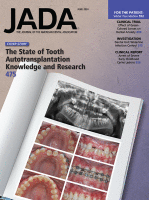

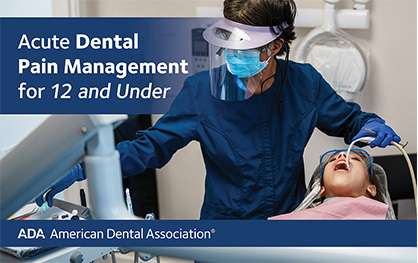






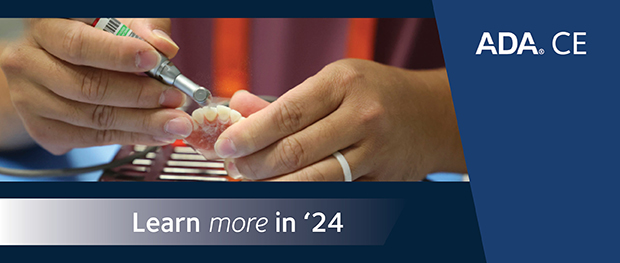
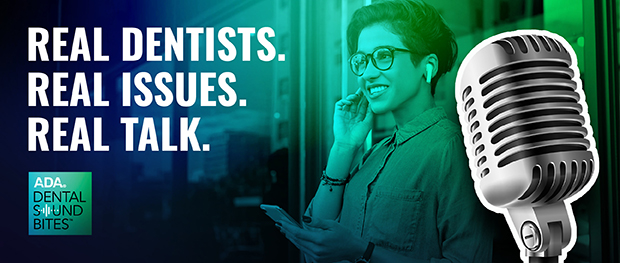
Image Gallery
List template: Image Gallery
Original size
Small: 240 px width
Thumbnail: 200x200 px
Thumbnail: 160x160 px
Thumbnail: 80x80 px
Thumbnail: 36x36 px
Calendar of Events
Calendars
Your ADA VisaⓇ rewards
Maximize the value of your credit card rewards for travel, gift cards and more!
Tours and river cruises
AHI Travel offers amazing river and land journeys with up to $750 per person savings.
Save on ocean cruises
Avid Traveling offers an instant $1,000 in cruise savings, plus future savings too!
Credit card processing
Best Card saves you thousands on processing fees for in-person, online and phone payments.
Patient financing
Save $165 when you join 100,000+ dental teams who offer CareCredit for patient financing.
Fitness Classes
Receive 10% more credits on all ClassPass memberships and access to audio and video workouts.
HIPAA and OSHA compliance
15% savings on HIPAA and OSHA compliance support that ensures you meet compliance requirements.
Interpretation and translation
CyraCom offers language services that build patient relationships. Save up to 50%!
Secure sharps handling from HealthFirst saves you up to $2,000 over pick-up systems.
Apparel for staff
Lands’ End Business offers 10% savings on workwear and promotional goods with your logo.
Save on team workwear
Get 10% off work apparel and promotional goods with your logo from Lands’ End Business.
Student loan refinancing
Laurel Road helps you manage student loans with 0.30% savings on refinancing options.
Computers and technology
Lenovo computers, laptops, tablets, servers and more – up to 50% off public web prices.
Upgrade your tech & save
Get up to 50% off everyday web prices on Lenovo computers, laptops, smart devices and more!
Payroll software
OnPay makes payroll easy for dentists! Enjoy 50% savings and the first three months free.
Practice financing solutions
Panacea Financial offers ADA members an exclusive rate discount on any dental practice loan.
Dental equipment
Great savings on dental equipment and support from WDA Service & Equipment Solutions.
9 Foods That Can Damage Teeth
If you love a healthy smile, enjoy these foods and drinks in moderation.
All About Fluoride
Learn more about nature’s cavity fighter and the science showing it’s safe and effective.
Choosing a Dental Plan
Clear explanations of how different plans work to help you choose a dental plan with confidence.
Choosing the right plan
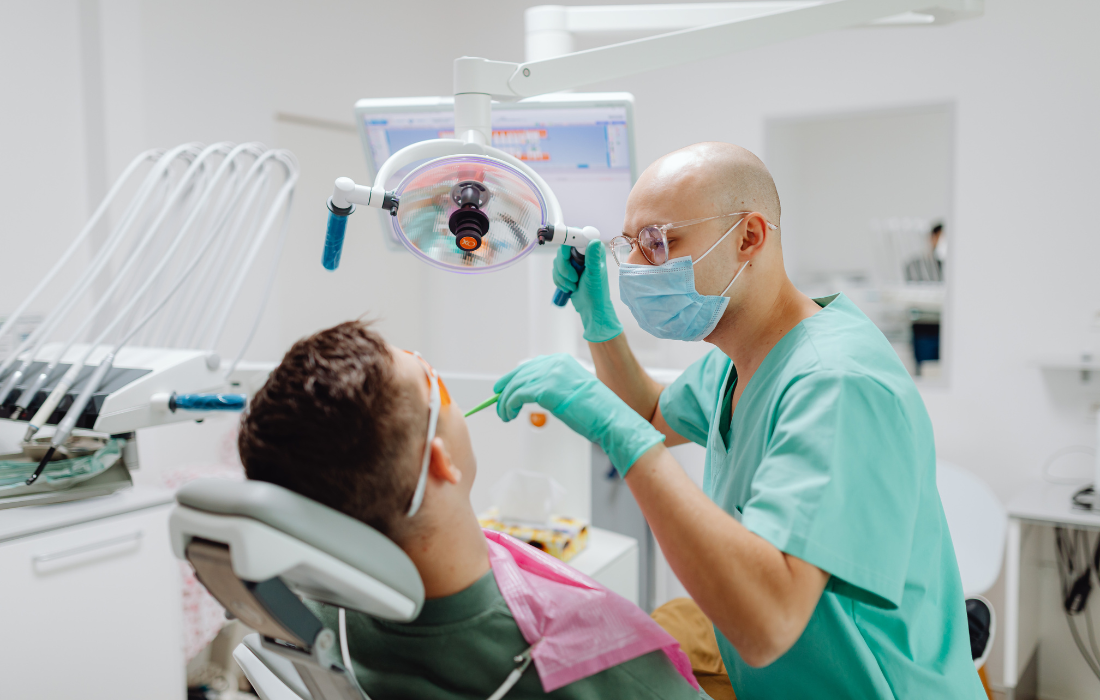
Choosing a Dentist
If you’re nervous about seeing the dentist, these tips can make your next visit easier.
Dental Health for Kids
Family-friendly tips and resources from Head Start, the nation’s early childhood program.
Dental Care During Pregnancy
Teeth and gums need special attention when you’re expecting.
Dental Tips for Teens
The lowdown on braces, whitening, keeping breath fresh and more.
Eat a Mouth-Healthy Diet
Set simple goals for healthy eating with MyPlate. Your teeth will thank you!
Low-Cost Dental Care
7 ways to find free or reduced-cost care for yourself or your family.
The #1 Drink for Healthy Teeth
Find out why drinking plenty of water makes such a difference in lifelong dental health.
Join the ADA
Elevate your career, your life and your momentum with resources and benefits.
Below is the only national Featured Box Group
Endorsed Programs
Endorsed Programs
BWT UI 2025-Video Gallery
Everyone knows that a balanced, nutritious diet is essential to healthy living. But did you know that eating patterns and food choices play an important role in preventing tooth decay and gum disease, too?
Brief video on the proper technique for brushing your teeth.
Awesome vintage advertisement for the American Dental Association from the 80s.
Classified Types
What is the purpose of a classified type?
#ResourceNotFound: DynamicContentResources, ClassifiedListing#Filter Header
List Header
AKC Registered & Vaccinated
Full ClassifiedCreative Solutions for Your Brand
Full ClassifiedGreat Condition, Low Price!
Full ClassifiedIdeal Location Near Downtown
Full ClassifiedSubtitle
Subtitle
Full ClassifiedUpcoming Events
This display uses the Events component with List template set to Events list.
Understand Cybersecurity Threats and Defend Your Practice from Attacks








.tmb-thumbnail.png?Culture=en&sfvrsn=dc555d4f_1)









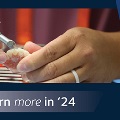
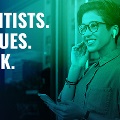






.tmb-small.png?Culture=en&sfvrsn=dc555d4f_1)
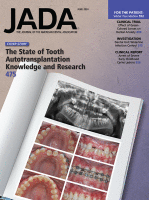








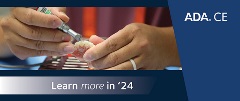
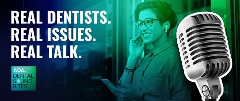






.tmb-medium.png?Culture=en&sfvrsn=dc555d4f_1)
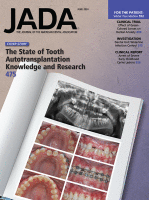








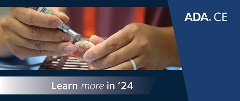
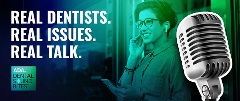






.tmb-thumb200.png?Culture=en&sfvrsn=dc555d4f_1)
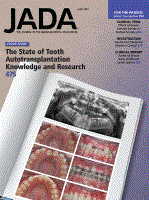
















.tmb-thumb160.png?Culture=en&sfvrsn=dc555d4f_1)



































.png?sfvrsn=4447de7f_1)







